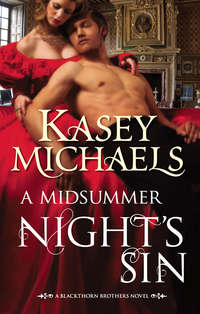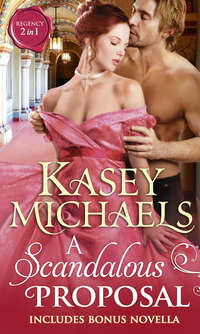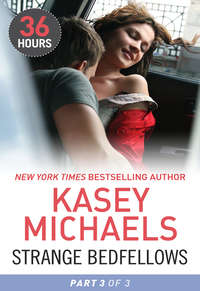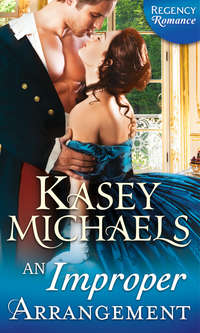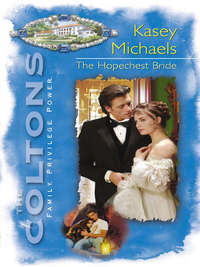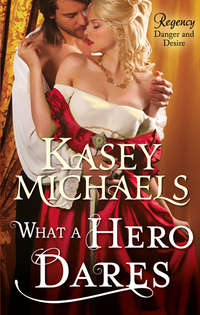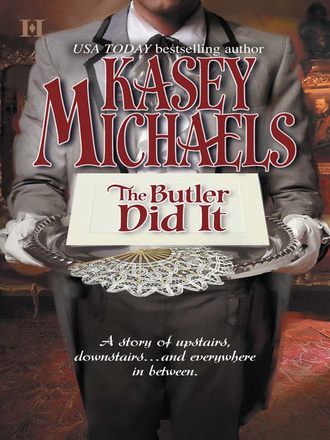
Полная версия
The Butler Did It
“No? Then, at last, we’re agreed on something. The thing about eel, Wycliff, is that rather rubbery texture when it isn’t cooked just right. Do you know what I mean? It can be swimming in the best, most creamy parsley sauce, but if you put it in your mouth and it sort of bounces off your back teeth, well—”
God was both testing him and punishing him, Morgan decided, as Wycliff tossed up his accounts all over his lordship’s shiny Hessians.
THIS WAS IT, the final test of his resolve. Edgar Marmon, Adventurer, and currently known as Sir Edgar Marmington, counted to ten to calm his queasy stomach as he stood just outside the tavern at the bottom end of Bond Street. He was getting too old for this, and knew that, if he hesitated, he would be in danger of losing his nerve.
But, as he was also in no monetary position to turn tail and run, and too aged to contemplate employing the sweat of his brow in an honest day’s work—probably because he’d never used the words “work” and “honest” in the same thought—he screwed himself up to the sticking point and soldiered on.
Once inside, his gaze roamed the place, seeking into the darkest corners, on the lookout for anyone who might see through his disguise of now snowy-white hair, a bushy white mustache, and the cane he used to support his limp, a leftover of his valiant service against the French, years earlier.
If one could count tagging after the army valiant as, for the most part, he had hidden himself in the rear during the day and left his visits to the battlefields to the dark of night, when he scavenged for any bits of loot he could find and carry away. If, not to make too fine a point on it, one could even call it a limp, as Sir Edgar, just to be sure he’d keep favoring the correct leg, placed a few pebbles in his left boot each morning, to remind him.
Sir Edgar selected the perfect small table in the corner, and carefully sat down in the chair that positioned his back to the wall. He ordered a bottle and two glasses, and announced very clearly to the disinterested barmaid that he was waiting for his good friend, the Viscount Claypole, to join him.
He’d wait a good long time for that, too, as Sir Edgar had made it his business to send the viscount a missive in the middle of the night, telling him he needs must hie himself home at once, as his father, the earl, was on his deathbed. As Claypole was located nearly thirty miles above Leicester, and the viscount was looking hard at finally inheriting his earldom, Sir Edgar was not disappointed in the man’s alacrity in obeying the summons, and waved him on his way from an alley as the viscount’s coach set north at first light.
Two or three days to Claypole. More, if this fog had drifted to the countryside. A few days’ rest as the viscount asked his father, repeatedly, “Are you quite sure you’re not dying?” A few days for the return trip.
And, by then, nobody would remember that Sir Edgar had even mentioned the man’s name.
“Oh dear, oh dear, where can he be?” Sir Edgar said several times over the next hour, as he consulted his pocket watch, as he looked anxiously toward the door to the street, sighed.
He only needed one. Two could be a problem, and three were definitely too many. More than one meant enough for a conversation, some shared contemplation, even an opening for a modicum of sense to overtake boundless greed. No, just one, that’s all.
He was considering if he should give it up as a bad job, and head for another tavern where the gentlemen of the ton thought it wonderful to rub elbows with the hoi polloi, select another target, when his last “oh, dear” finally caught the attention of the well-dressed, and fairly well into his cups gentleman at the next table.
“A problem, sir?” the man asked. Then, without waiting for an invitation, he picked up his glass and his bottle and joined Sir Edgar. “You’re waiting for someone, right? So am I, but I’ve got the feeling old Winfield is still probably hiding his head under the covers. We drank fairly deep last night, and the man doesn’t have the liver he should.” He stuck out his hand. “John Hatcher.”
Yes, Sir Edgar knew that. John Hatcher. No title, but a family that went back to the Great Fire (and may even have started it, if all his ancestors were as inept as this particular member of the Hatcher clan). Money that went back ever farther than that conflagration. Brains that had got misplaced somewhere along the way.
Oh, yes, Sir Edgar knew all about John Hatcher.
“It is a pleasure, sir,” Sir Edgar said, allowing his thin, trim hand to be half crushed in the bearlike grip of the much larger man. “Sir Edgar Marmington. I’m new to the city, never been here before, but my old school chum, Claypole, promised to…um…show me the sights. Can’t imagine where he is.”
“Claypole? Bit of a dry stick, that, don’t you think? I mean, maybe you wouldn’t know, not if you haven’t seen him since your school days, but he’s dull as…as a clay pole. Har! Har! That was a good one, eh? No, friend, you don’t want him. Claypole’s idea of seeing the sights would be a tour of all the churches, Lord help you. You’re better for him gone.”
Sir Edgar smiled, all attention. “Really? Not that I’m the hey-go-mad sort myself, understand. Sadly bookish, actually. But we’ve been corresponding, the viscount and myself, and he’d seemed so interested in my work…my travels through the ancient lands, my discovery of that old tome that told all about…”
Now Sir Edgar sighed. “I had so wanted to tell him in person that I’m wonderfully close now…at the very brink of discovery. He’s been so generous, subsidizing me monetarily in my research all these twenty years or more, you understand, for the greater end, the final reward. All I need are a few more things to complete my duplication of the monks’ experiments, the alchemist’s notes, and he’d promised—but, no, this is of no interest to you.”
“Probably not,” Hatcher said, tossing back the contents of his glass, and then pouring himself another measure of wine even while calling for a full bottle. “Don’t think I ever read a book, God’s truth. Pride m’self on that. Monks, you said? And what the devil’s an alchemist?”
Sir Edgar sat back, looked around the room nervously, then leaned in close, to whisper to John Hatcher….
“WHAT’S THIS MESS?” Olive Norbert whispered to Daphne Clifford in her booming voice (which is to say, she was probably heard in Tothill Fields, by little old ladies with brass ear trumpets), as she employed her fork to poke suspiciously at something on her plate. “It don’t look right. Looks sick.”
“More than sick, Mrs. Norbert,” Fanny said, winking at Emma. “It’s dead. And, as it’s escargot—that would be a snail, Mrs. Norbert—a snail, minus its shell, it demned well better would be dead, or I’ll be marching into the kitchens myself to ask why not. Oh, and because you’re looking as if you don’t believe me, please allow me to state this very firmly—it’s food.”
“Not on my plate, it ain’t,” Olive Norbert declared, pushing the serving of genuine French snails away from her with the tip of her fork. “Slimy things, leaving trails up the wall in the damp. Here now, you. Cart this mess off,” she commanded to Riley, doing duty at the table this evening.
“Bring me some meat, boy. Bloody red with juice. And a pudding. Go on, hop to it! I’m paying down good money for snails? In a pig’s eye, I am. Oh, and some ham, while you’re about it. It’s meat I want, and meat I will get or know the reason why.”
As Mrs. Norbert was twice Riley’s size (width-wise), and a paying guest, Riley hopped to, ready to serve, although it grated on him something awful, it really did. Mrs. Norbert was a pudding herself, a short, fat prawn with tiny, mean green eyes glinting out of a lumpy face, and with piss-yellow hair that frizzed here, curled there, but didn’t quite cover the shine of skin on the top of the behemoth’s head. She was no better than him. Maybe a whole lot worse.
“And it’s not me wanting you to try to cudgel that ugly brainbox of yours to think up a reason why, no, ma’am, it’s not,” Riley muttered under his breath as he turned to walk away.
Emma heard him, however, and kept her head down, to hide her smile. Mrs. Norbert might be crude, bordering on obnoxious most times, but she also had a point. When pinching the purse strings tight, the first thing to be sacrificed was meat. There had been many a meatless evening in the Clifford household until the next quarter’s allowance arrived from her father’s small estate.
“Um, Riley?” Daphne called timidly. “If…if I could also have this taken away? I…I think there may be eyes in it.”
“Oh, all right,” Fanny said, waving her hand. “We all want these snails gone, Riley. Might as well own up to it. Fancy is as fancy does, and I don’t really fancy chewing on these things. What’s up next?”
“I’ll check straightaway, madam,” Riley said, gathering up the “snail course” and piling the plates on his arm. “Just nip belowstairs to ask Mrs. Timon.”
“Evening, all. Started without me, I see. Riley, you rotter, you look better than me, and I consider that an insult, I truly do.”
Riley, and the rest of the company, turned in the direction of the sound, to see Clifford Clifford lurching into the room like a man who has been at sea for months and was just now touching down on dry land, holding on to chair backs until he could collapse into his own chair, beside his sister.
“About time you showed up, you pernicious little weasel,” Fanny said from her position at the bottom of the table. “Shameful, a man who can’t hold his spirits. You look terrible.”
And he did. Other than the lurching from chair to chair, Cliff’s dark hair appeared faintly greasy, and one lock hung down unflatteringly over his normally light gray but at the moment quite bloodshot eyes. His cravat was askew, his waistcoat misbuttoned, and his jacket still resided in his room rather than across his shoulders.
Daphne gasped at her beloved son’s disheveled appearance and rose from her seat, grabbing up her serviette and dipping it into the floral arrangement in the middle of the table. “Here, darling, cool water for your aching head,” she said, after racing around to the other side of the table, trying to dab her son’s forehead. “Mama will fix.”
Cliff fought his mother away by turning his head this way and that, and finally by grabbing the serviette and tossing it to the floor. “Don’t do that, Mama, I’m not a child,” he said, and Daphne, accustomed to taking orders from anyone in breeches, promptly returned to her chair and sat down. And proceeded to sulk. Over the course of her marriage, she had quite mastered the injured sulk.
“If you’re not a child, Cliff, I propose you stop behaving like one,” Emma said, resigned to her role as her brother’s keeper.
Cliff took great exception to his sister’s mild rebuke. “Child, am I? I’m head of this household, remember? I’m the man. So what’s he doing, sitting at the head of the table?”
Sir Edgar looked up from his plate—the one that now held three servings of escargot, because he was one, hungry, and two, sitting closest to Riley as he’d tried to leave the room with the rejected dishes.
“Forgive me,” he said, smiling at the ladies. “In an attempt to render myself politely deaf during a domestic upheaval that I, as a gentleman, have chosen to ignore—have I missed something? Oh, hallo there, Clifford. Mind if I pretend I didn’t see you join us?”
“Ha! Very good, Sir Edgar,” Fanny said approvingly. “Now, if you can say you likewise didn’t notice my daughter-in-law’s silly outburst, I’d say you were kin to my late husband, who could blissfully ignore me if I entered the room with my hair on fire if he thought I might ask him to put it out.”
“My thanks, madam, for being compared to your beloved husband. I am honored, at least I think I am,” Sir Edgar said, smiling as Riley laid a plate groaning under the weight of roasted beef in front of him.
“Not if you knew him,” Fanny said, winking at Sir Edgar. “Cliff, over there, puts me in mind of him most, after my late son. None of the three of them cared a jot save for their own comfort. Luckily, my late husband paid so little attention to me that I was free to find my own pleasures. Greatest pity of my life has to be that my son turned out to be his son as well. Could have gone either way, you understand. Several ways, actually.”
“Mother Clifford!” Daphne exclaimed, looking straight at Emma with a look meant to say “in heaven’s name, Do Something.”
“We missed you at luncheon today, Sir Edgar,” Emma broke in gamely, smiling at the man as she leaped toward the first thing to jump into her head. “Were you out, in this horrid fog?”
“Only for a few hours, Miss Emma,” Sir Edgar said, “and I chanced to meet a delightful man. Mr. John Hatcher. Is the name familiar to anyone?”
“No, I can’t say that it is,” Fanny said, sitting back in her chair, sorry to have the subject changed, just when she was having so much fun.
“I fear not,” Daphne apologized, still looking at Cliff and mentally rebuttoning the boy’s waistcoat.
“I knows him,” Mrs. Norbert said, her mouth full of beef. “Sent his latest fillies to our shop, to dress ’em out. Great fondness for red satin he had, John Hatcher. Paid his blunt on time, sometimes with a little extra for us in the sewing room. A real toff.”
Thornley, who had decided it was cowardly to completely avoid the dining room, heard this last bit of wisdom from Olive Norbert as he pushed open the swinging door…and immediately retreated to the kitchens. And he’d tried so hard to fit together a comfortable group for the Season. Next year, he promised himself, he would require extensive references!
JOHN HATCHER STOOD in the middle of the enormous study holding the extensive library his family had collected over the years, and frowned as he approached the wall entirely devoted to blue and green covers.
“Anderson?” he called over his shoulder to his man of business. “Be a good fellow and find me a book on alchemists. We must have one. Lord knows we have everything else.”
Anderson put down the newspaper. “Alchemists, sir? I know what they are, or what they were purported to be.”
Hatcher snatched up his snifter of brandy and plunked himself down in the facing chair in front of the fireplace. “Purported? Is that good? Tell me.”
“Well, sir, the most venerable practice of alchemy is believed, by most scholars and devotées, to have been originally generated in—” He hesitated, realizing his life would be made immensely easier if he employed as few large words as possible. “That is, alchemists began their work a very long time ago, in a faraway country. Very wise men.”
His employer leaned his elbows on his knees, and grinned. “Wise, eh? How do you know?”
Anderson hadn’t kept his position for fifteen years without learning how to please his employer. “I…I think they wore pointy hats, sir.”
Hatcher nodded eagerly. “Yes, they would, wouldn’t they? With stars on them, I’ll wager. So where are they now? These alchemists?”
“Unless there are a few more recent adherents to the tenets, I think it would be safe to say that they’re all quite dead, sir. Although there are those who say that, before succumbing to their mortal ills, they may have succeeded in discovering a way to turn base metals into gold.”
“Ah-ha!” Thatcher said, thrusting his fist into the air. “And they probably wrote it all down somewheres, how they did it. I mean, you’d write it down, wouldn’t you? How to do it?”
All right, so now Anderson was interested. “Yes, sir. I’d write it all down. Why do you ask?”
“None of your business, boy, none of your bloody business,” Thatcher bit out, and quit the room.
AS WAS CUSTOMARY in all the great houses, the females gathered in the drawing room after dinner, taking their tea there while the men remained in the dining room, tossing back brandy, gnawing fruit and blowing a cloud with their cheroots.
“There’s something havey cavey about Sir Edgar,” Fanny pronounced, sipping brandy—not a lady’s drink, but Fanny had her own definition of what a lady does, which had a lot to do with what that lady wants.
As Daphne had picked up her embroidery and was busy counting stitches, and Emma was pointedly ignoring her grandmother, it was left to Olive Norbert to ask, “Like what? Seems all right to me.”
Fanny rolled her eyes. “And, if I but valued your opinion, Mrs. Norbert, that would weigh heavily with me, I assure you. The man is too clever. Too clever by half.”
“You’re just saying that because you prefer your men stupid,” Emma said before she realized that, yes, her mouth could move before her brain was fully awake to what it was saying.
“Not true, my dear. I can’t abide Cliff. Couldn’t stand his father, or his father before him. And if you want to find three more stupid men, I suggest you take a lantern and have Mrs. Timon pack you a lunch.”
“My Cliff is not stupid, Mother Clifford,” Daphne said, putting down her embroidery. “His last tutor told me he’s quite inventive.”
Emma refused to meet her grandmother’s eyes, but just waited for that woman’s comment.
“Inventive, is it? Of course. That would explain how the idiot child was sent down last term for throwing his lantern at a mouse he saw peeking at him from a corner of the room. I say the boy’s just lucky his eyebrows grew back.”
“More tea, anyone?” Emma asked, trying not to look at Mrs. Norbert.
“It was an accident, and I would take it as a kindness, Mother Clifford, if you were not to speak of Cliff any more this evening,” Daphne said, picking up her embroidery once again, as counting stitches was less stressing than listening to her youngest child’s less-laudable exploits trotted past her.
Olive Norbert shoved another pastry into her already fairly full mouth, and said, “You know, I’m ponderin’ this, what you said. Sir Edgar says he’s never come to London before, but I asked him to pick up some number-three lacing for me at m’old shop, and he didn’t even ask the way. I didn’t think on that until now. How’d he do that?”
“A guide book? A map? Inquiring of someone he passed on the street?” Emma suggested, wishing the woman would keep her questions to herself, and praying that her grandmother would not think it wonderful to share whatever she had discovered about the man on her visit to Sir Edgar’s bedchamber that afternoon.
Fanny tapped one slightly gnarled finger against her chin. “Possible. Possible. Oh, and he is not acquainted with the marquis. I already asked him that, and he said he did same as us, answering the newspaper advertisement.” She smiled sweetly at Olive. “Someone read it to you, Mrs. Norbert?”
“I can read for myself,” Mrs. Norbert said, raising two of her three chins in defiance. “I can also pick you up and toss you over my shoulder, old lady.”
Emma stood up, putting herself between her grandmother and the irate seamstress. “Please, please, Mrs. Norbert, forgive my grandmother. She’s, um, elderly?”
“She’s mean as a snake, that’s what,” Mrs. Norbert said, sitting back in her chair and crossing her plump arms over her chest. “I know you don’t want me here, think you’re all so hoity-toity and better’n me. And I don’t care. Long as I’m eating good.”
“And Lord knows you’re doing plenty of—” Fanny began, but Emma whirled on her and glared. “Sorry,” she said quietly. “All right, all right, I’ll put the gloves back on. It’s this demned fog, that’s what it is. Look at it, creeping in under the windowsills. We’re all just stuck in here, cheek by jowl, and I’m tired of it. I have plans.”
Hearing her grandmother mention that she had plans set Emma’s teeth on edge. This couldn’t be good….
“THIS FOG COULDN’T be worse,” Morgan Drummond said, peering out the side window of his coach, trying to see past the minuscule yellow glow cast by the few gas lamps lining the street, to the buildings beyond. “I think we’re close now, but I can’t be sure. Wycliff? For God’s sake, man, stop clutching the door as if a great fog monster was going to yank it open at any moment, pull you outside and bite off your head. I’ve given up my hopes of that a good hour ago. Ah—we’re stopping.”
Morgan drew the edges of his cloak over his knees and tied the laces at his throat, then reached for his curly-brimmed beaver on the seat beside him. “Heave to, Wycliff, we’ve arrived.”
“How…how can you be sure, my lord? I don’t see anything out there.”
“True, neither do I. But as the nothing out there is highly preferable to the something in here, I’m willing to hazard the gamble.” So saying, he opened the door on his side of the coach, kicked down the steps and then ignored them to hop onto the cobbles, nearly coming to grief as the slippery stones sent him momentarily off balance.
“We’re here, your lordship,” the coachman called down to him unnecessarily, even as servants riding in the second coach (normally following far behind the master’s coach, but tonight, because of the fog, riding directly on its heels), bustled forward to assist the marquis. “We’ll just drive around to the mews and unload the baggage and see to the horses.”
“Do that, Briggs, and thank you. Make sure Sampson is taken care of, as well? Then take yourself to the kitchen, for something to eat.”
“Yes, my lord,” Briggs assured him, as assorted Westham servants and grooms got on about their business.
Wycliff pushed two of them out of the way in his haste to be the one who ushered Morgan up the rounded set of steps, to the double front doors, lit on either side by dying flambeaux.
“This way, my lord. Watch your step, my lord. I’ll bang the knocker for you, my lord.”
“Control yourself, Wycliff, before you do yourself an injury. I’m not in my dotage yet, I can knock at my own door,” Morgan said, lifting the knocker.
Then he hesitated. “Strange. The knocker shouldn’t be on the door, as I’m not in residence.”
“Shoddiness, my lord,” Wycliff said quickly. “It’s the only answer. The master’s gone and slack seeps in everywhere. I’ll be sure to have a remonstrative word with the staff.”
“Do, Wycliff, and I’ll have a remonstrative word or two with you, understand? Thornley is my family’s treasure, and is not to be read a lecture by a skinny shanks like you,” Morgan said, giving the knocker three sharp hits against its brass base.
“But…but I should announce you, my lord. It’s my duty…my pleasure…my—”
“I don’t announce myself at my own door, either,” Morgan said, putting a quick period to that argument. But he was maintaining his composure, albeit with a firm application of will. Wycliff did serve a purpose: proof that his master could control his once-volatile temper.
The door opened and Morgan was presented with a fairly well set up young footman, dressed in the Westham livery, wearing a powdered wig, as was the custom. And gnawing on a chicken leg, which was not.
Morgan looked at the lad, looked him up and down, and then stepped inside the mansion as the footman backed up three paces, his eyes wide, the chicken leg still stuck in his mouth.
“I’d hand over my hat and cloak, but I have a fondness for both, and wouldn’t wish them clutched in your greasy paws. New, aren’t you? What is your name, boy?”
“Ri-Riley, sir,” the footman managed to choke out before looking at the chicken leg and quickly hiding it behind his back. This was the Quality standing before him, and Riley knew it. A very tall and broad and intimidatingly male bit of the Quality. “You…you’d be standing in the foyer, sir.”
“Indeed, yes, how observant of you. But we’ll soon correct that, won’t we? Kindly rouse Mrs. Timon and tell her I wish refreshments in the drawing room in half an hour. She need not bother to cook anything. Cold meat and fruit will do. And a loaf, one with seeds, as I much prefer that.”
“You…you’re wanting…”
“Magnificent! So heavy, too. It could fall.”
Morgan looked to Wycliff who, for all his fine promises that he was a valet of much experience and familiar with the workings of a great London house, serving an exalted master, was now standing, mouth agape after his exclamation, apprehensively staring up at the remarkable chandelier brought from France fifty years previously by an earlier Marquis of Westham.




